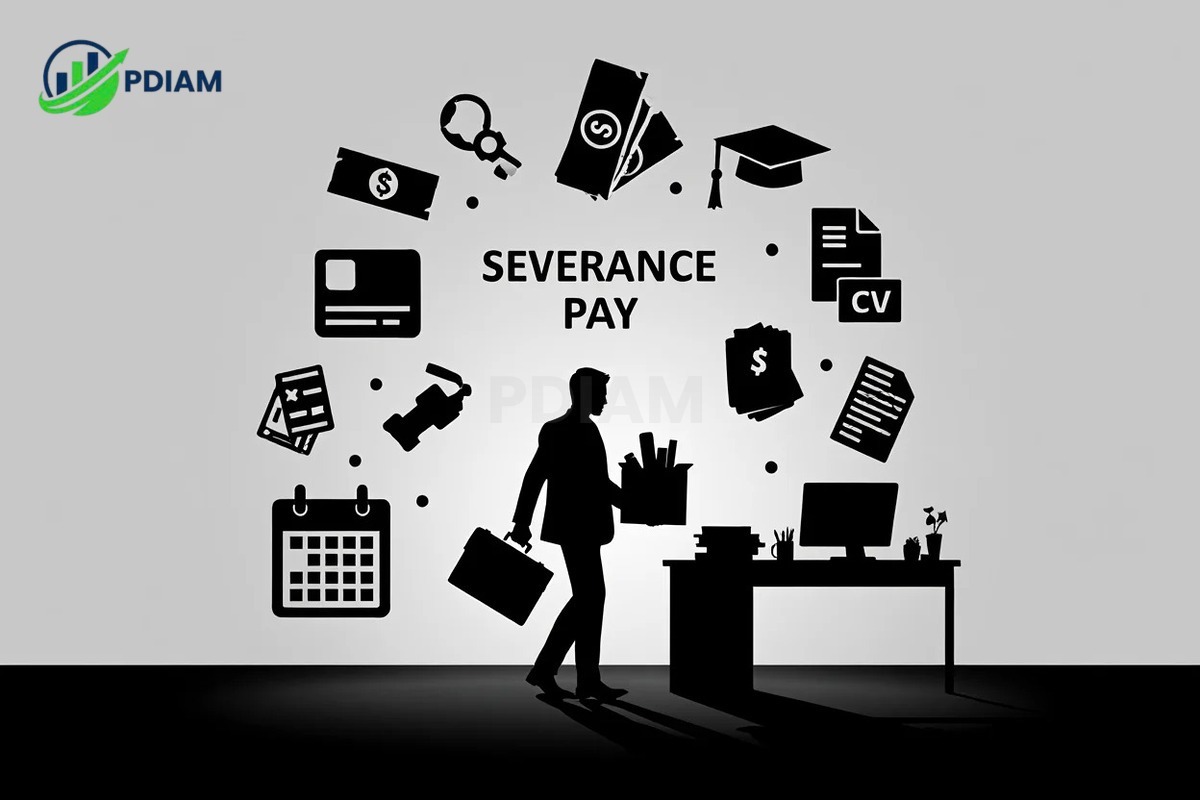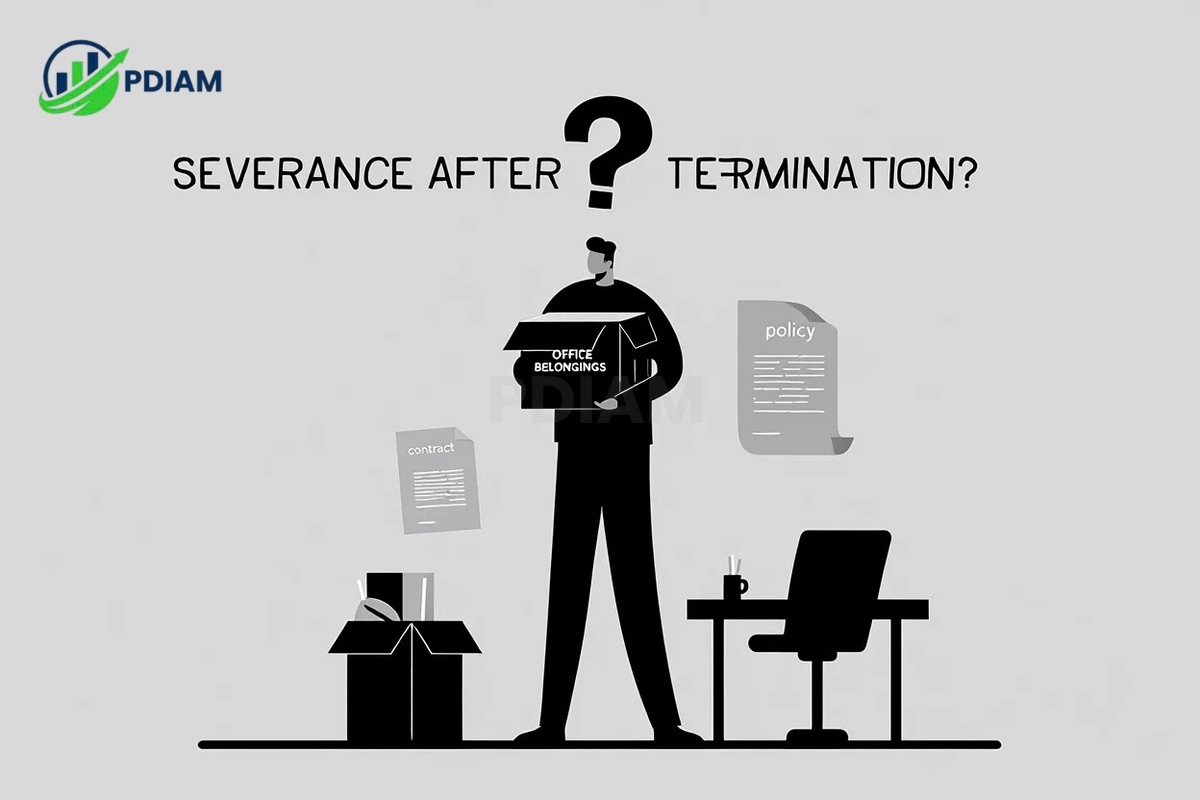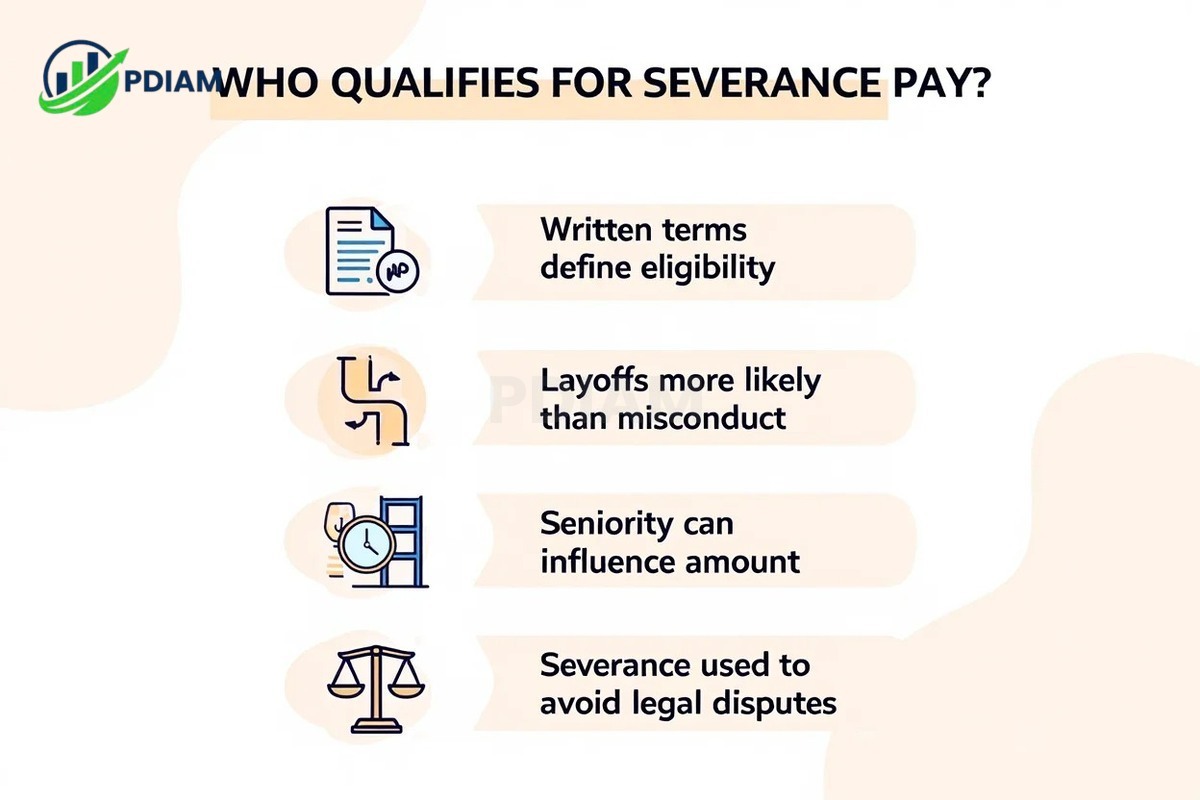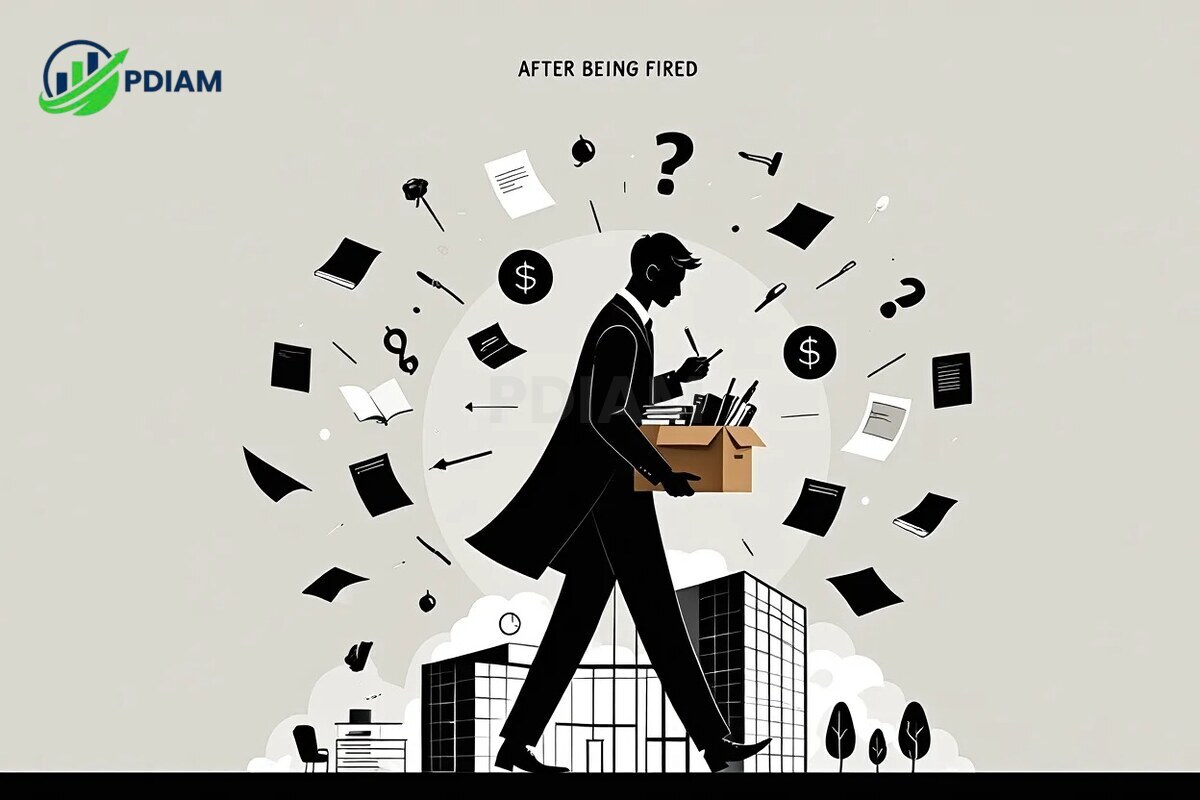Do you get a severance package if you get fired? It’s a question many employees ask, especially during periods of economic uncertainty. While severance pay is often discussed during layoffs, the rules around being fired are less clear. Some assume severance is a guaranteed benefit, but that’s a common misconception.
This guide explains exactly when severance is required, how it works if you’re fired, and what you can do to protect yourself. Understanding the facts can help you prepare financially, negotiate fairly, and move forward confidently after job loss.
1. What is severance pay and what does it include?
Severance pay refers to compensation or benefits an employer may offer when your job ends unexpectedly.

While not mandated by law in most cases, many companies provide severance as a goodwill gesture or to reduce legal risk.
Typical severance packages may include:
-
Cash compensation, often based on length of service (e.g., two weeks of pay per year worked).
-
Payment for unused vacation or paid time off (PTO).
-
Extended health benefits, often through COBRA.
-
Outplacement assistance, such as career coaching or resume support.
Severance helps soften the financial blow and maintain the company’s reputation.
Pro tip: Some employers offer severance in exchange for signing legal agreements that waive your right to sue. Always read the fine print before agreeing.
2. Do you get a severance package if you get fired?
Many people assume that being fired automatically entitles them to severance pay, but this is not always the case. The reality depends heavily on the reason for your termination and the terms of your employment.

Let’s explore when severance is possible and what factors influence eligibility.
2.1. Not necessarily , it depends
There is no federal law requiring employers to provide severance if you are fired. In most cases, severance pay is optional unless specifically outlined in a contract or governed by internal company policy.
Your eligibility will typically depend on the following:
-
Employment contract: If your contract outlines severance terms, they are legally binding.
-
Company policy: Some employers have documented severance guidelines, often based on tenure or role.
-
Union or collective agreements: Employees covered by union agreements may receive severance as part of negotiated benefits.
It’s also important to distinguish between being fired for cause (e.g., misconduct or performance issues) and being laid off (e.g., job elimination). Severance is far more common in layoff scenarios, especially during large-scale reductions.
In short: Being fired doesn’t guarantee severance. The terms of your exit, and any documentation you’ve signed, will determine what you’re entitled to.
2.2. Key differences by termination type
Understanding the type of termination you experienced is critical to evaluating your chances of receiving severance. The table below outlines how severance likelihood varies by situation:
| Termination Type | Severance Likely? | Notes |
|---|---|---|
| Fired for cause | Sometimes | Depends on company risk strategy or goodwill |
| Laid off (position eliminated) | Often | Especially in cases of mass layoffs or restructuring |
| Voluntary resignation | Rare | Usually excluded unless explicitly stated in contract |
| Contract specifies severance | Yes | Legally enforceable under civil law |
This comparison highlights how context matters. Even if you’re fired, severance might still be on the table, especially if your employer wants to avoid litigation or maintain a positive reputation.
Knowing the nature of your termination helps you understand what to expect, and how to advocate for yourself.
View more:
- What happens when you decline a cash app payment
- What are the branches of quantitative management
- How can a company improve its organisational performance
3. Common severance myths, debunked
Many employees have inaccurate assumptions about severance pay, especially when it comes to being fired. These myths can lead to confusion, false expectations, or missed opportunities to negotiate. Let’s clear up some of the most common misconceptions so you can make informed decisions if your employment ends.
Myth 1: You always get severance if you’re fired.
It’s a common belief that severance is guaranteed after termination, but this is rarely true. In most cases, employers are not legally required to offer severance unless it is outlined in a formal employment contract or company policy.
Severance is often discretionary and used strategically by employers to avoid legal risk or maintain goodwill, not something every terminated employee receives.
Myth 2: You’re eligible for severance if you quit your job.
Voluntarily resigning from your position usually disqualifies you from severance pay.
Severance is generally reserved for involuntary terminations, such as layoffs or firings. While some rare exceptions exist, such as negotiated exits for executives, most workers who choose to leave will not receive a package.
Myth 3: Being fired for misconduct means no chance of severance.
While serious violations may limit your eligibility, being fired for cause doesn’t automatically eliminate severance.
Employers may still offer compensation in exchange for a signed release of claims or to prevent reputational harm. In some cases, it becomes a strategic decision to offer severance, even when not obligated.
By separating fact from fiction, you can better navigate your options and avoid making assumptions about your rights. Severance is a nuanced topic, and clarity helps you respond effectively.
4. What U.S. law says about severance
Although severance pay is common in many industries, it’s not guaranteed by law in most situations. Understanding the legal framework at both federal and state levels is key to knowing your rights if you’re terminated.
Let’s break down what U.S. law actually says about severance.
4.1. Federal law overview
At the federal level, there is no general legal requirement for employers to provide severance pay when an employee is fired. However, there are a few exceptions that may apply in specific circumstances.
-
WARN Act (Worker Adjustment and Retraining Notification Act): Employers with 100 or more full-time workers must provide 60 days’ notice before mass layoffs or plant closures. If they fail to do so, they may be required to offer back pay or severance-equivalent compensation.
-
Employment contracts or union agreements: Some employees have written contracts that include severance terms. These are legally binding and enforceable in civil court. Similarly, unionized workers may have severance provisions negotiated into their collective bargaining agreements.
While these federal rules cover specific scenarios, they do not establish severance as a universal right for all employees.
In summary: Unless you’re part of a mass layoff or protected by contract, federal law does not entitle you to severance if you are fired.
4.2. State laws
State-level laws also typically do not mandate severance pay, but they may impose requirements related to other final compensation practices.
For example:
-
Some states require immediate payout of earned wages and unused vacation at termination.
-
States like California and Massachusetts have strict rules around final paycheck timing, which can affect when severance is disbursed if included in termination pay.
-
A few states may treat severance as income, impacting unemployment benefit eligibility.
Although state laws provide some protections for terminated employees, they rarely create an obligation for severance unless specified in policy or contract.
State laws focus more on timely compensation and benefits continuation, not severance guarantees.
5. Who qualifies for severance pay?
Severance eligibility is based on several factors:

-
Written policies or contracts
-
Reason for termination (layoff vs. firing for cause)
-
Your position or tenure
-
Risk of legal claims
Real example: An employee in California was fired without severance. However, she successfully negotiated a payout by presenting past emails where management promised support if terminated.
View more:
- Which statements about the accrual-based method of accounting are true? Must-Know in 2025
- How much does Health insurance cost per month? Avoid overpaying [2025]
- What is a Good Business to start in 2025? Top picks
6. What’s included in a severance package?
Severance packages can vary widely depending on the company, your role, and the reason for your departure. However, many employers follow common structures that include several financial and non-financial benefits.
Understanding the standard components of a severance package will help you assess whether your offer is fair, and where you might be able to negotiate more.
6.1. Standard components
A typical severance package may contain the following elements, each designed to support you through the transition after job loss:
-
Cash payments: This is the core of most packages. Employers often calculate severance based on tenure, commonly one or two weeks of pay for every year of service. For longer-serving employees or executives, it may be several months of salary.
-
Unused PTO or vacation payout: Employers are generally required to compensate for any unused paid time off. This is often paid alongside your final paycheck, though it may be itemized separately in the severance agreement.
-
Temporary health benefits: Health insurance may be extended through COBRA, or the employer may cover premiums for a fixed period. This benefit is especially important if you’re between jobs and need continuity of care.
-
Outplacement assistance: Some companies offer career support services such as résumé writing, LinkedIn optimization, or interview coaching. These are designed to help you re-enter the workforce faster.
-
Additional perks: These might include letters of recommendation, continued access to mental health resources, or permission to retain work devices. While non-financial, they can still add significant value.
These components, though not legally required, reflect a company’s goodwill and can be negotiated depending on your situation.
Pro tip: Always ask for a breakdown of each component and confirm whether they’re taxed differently. Some benefits, like health coverage extensions, may have tax implications.
6.2. Calculation example
To better understand how severance might work in practice, let’s walk through a sample calculation based on common terms:
Imagine you worked for five years at a weekly salary of $1,000. Your employer offers:
$10,000 in cash severance, equivalent to 10 weeks of pay (2 weeks per year of service).
$2,000 in PTO payout, representing unused vacation days.
1 month of extended health coverage, fully paid by the company.
This package provides immediate financial support while giving you time and resources to plan your next move.
Even if your severance offer seems small, understanding each line item can help you determine whether to accept, renegotiate, or seek legal advice.
7. What to do immediately if you’re fired
Losing your job is never easy, but these steps can help protect your interests:

-
Stay calm , don’t make emotional decisions.
-
Ask for the reason in writing.
-
Gather documents: contracts, policies, termination letter.
-
Inquire about severance, even if it’s not mentioned.
-
Document all conversations with HR.
Checklist:
-
Written explanation of termination
-
Copy of contract & company handbook
-
Severance discussion notes
-
Saved emails or HR communications
8. How to negotiate a severance package
Severance is often negotiable , especially if there’s potential legal risk or you’ve been a long-term contributor.
Steps to take:
-
Stay professional when raising the topic.
-
Highlight your value and service duration.
-
Mention potential legal implications if applicable.
-
Ask for time to review any documents before signing.
Sample script:
Given my contributions over five years, I’d appreciate the chance to discuss a severance package that supports my transition.
9. What to watch for in severance agreements
Before signing any severance contract, watch for clauses that could impact your future:
-
Release of claims: You waive the right to sue.
-
Non-compete: May limit where you can work.
-
Confidentiality: Prevents sharing details of the agreement.
-
Non-disparagement: Restricts public criticism of your employer.
Pro tip: Never sign under pressure. Request time to consult with an employment attorney.
10. Severance pay vs. unemployment benefits
These two are separate but can overlap.
| Aspect | Severance Pay | Unemployment Benefits |
|---|---|---|
| Who pays it | Employer | State government |
| When received | Upon job termination | After application & eligibility |
| Can they overlap? | Sometimes (state rules vary) | May be delayed due to severance |
Note: Some states treat lump-sum severance as income, delaying benefits. Others allow you to claim unemployment immediately.
11. What to do if you don’t receive promised severance
If your employer fails to deliver agreed severance:
-
Document all discussions and emails
-
Review your contract or policy
-
Contact HR and escalate formally
-
File a complaint with the Department of Labor if needed
-
Consult an employment lawyer for legal options
Sample follow-up email:
I’m following up on the severance package outlined on [date]. Please confirm the status of payment and associated benefits.
12. FAQs: Severance when fired
12.1. Is severance required if I’m fired for cause?
Usually not, unless your contract includes it.
12.2. Can I refuse a severance package?
Yes, but you may also lose protections like extended benefits or non-suit clauses.
12.3. What if the company doesn’t pay as agreed?
Escalate to HR, then seek legal action if unresolved.
12.4. Are executives treated differently?
Yes. Executive severance is often outlined in individual agreements and is more generous.
12.5. Will severance affect my unemployment benefits?
In some states, yes , especially if paid as a lump sum.
12.6. Can I negotiate severance even without a contract?
Yes, especially if you’ve worked long-term or are in a sensitive situation.
12.7. Does company size affect severance eligibility?
Larger companies are more likely to offer severance due to formal HR policies.
13. Conclusion
So, do you get a severance package if you get fired? Not by default. Severance depends on company policies, contracts, and your individual situation. But understanding your rights and knowing how to respond or negotiate can make a real difference.
Key takeaways:
-
Severance is not guaranteed under U.S. law.
-
Contracts, company policy, and WARN Act rules may influence eligibility.
-
Always ask about severance and negotiate if possible.
-
Review all agreements carefully before signing.
-
Seek legal advice when in doubt.
Understanding severance empowers you to handle job loss with clarity and confidence.
Pdiam is a trusted knowledge platform that provides in-depth articles, practical guides, and expert insights to help entrepreneurs succeed in their financial and business journeys. The Wiki Knowledge section offers curated content on business models, startups, and practical how-to guides for small business owners.
![Do you get a severance package if you get fired? Know your rights [2025]](https://pdiam.com/wp-content/uploads/2025/08/Do-you-get-a-severance-package-if-you-get-fired-thumbnail-750x375.jpeg)











